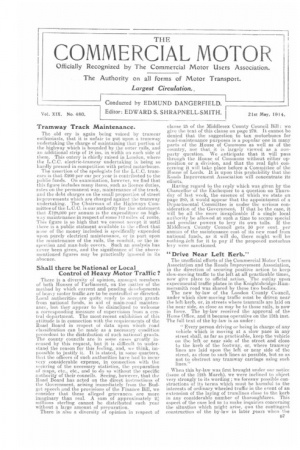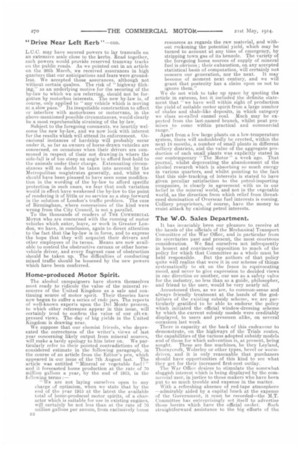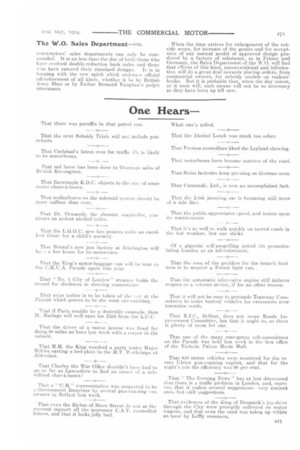Tramway Track Maintenance.
Page 1

Page 2

Page 3

If you've noticed an error in this article please click here to report it so we can fix it.
The old cry is again being voiced by tramcar enthusiasts, that it is unfair to put upon a tramway undertaking the charge of maintaining that portion of the highway which is bounded by the outer rails, and an additional strip of 18 ins, in width on each side of them. This outcry is chiefly raised in London, where the L.C.C. electric-tramcar undertaking is being so hardly pressed in competition with petrol motorbuses.
The assertion of the apologists for the L.C.C. tramcars is that .200 per car per year is contributed to the public funds. On examination, however, we find that this figure includes many items, such as licence duties, rates on the permanent way, maintenance of the track, and the debt charges on the small proportion of street improvements which are charged against the tramway undertaking. The Chairman of the Highways Committee of the L.C.C. is our authority for the statement that £128,000 per annum is the expenditure on highway maintena.nee in respect of some 1,12 miles of route. This figure is so high that we cannot accept it until there is a public statment available to the effect that none of fhe money included is specifically expended upon purely electrical maintenance, or in part upon the maintenance of the rails, the conduit, or the inspection and man-hole covers. Such an analysis has never been given, and the significance of the abovementioned figures may be practically ignored in its absence.
Shall there be National or Local Control of Heavy Motor Traffic ?
There is a diversity of opinion, amongst members of both Houses of Parliament, on the niatter of the method by which current and pending developments of heavy motor traffic, are to be controlled or directed. Local authorities are quite ready to accept grants from om national funds, n aid of main-road maintenance, but they appear to be disinclined to welcome a corresponding measure of supervision from a central department. The most-recent exhibition of this attitude is in connection with the requirements of the Road Board in respect of data upon which road classification can Lie made as a necessary condition precedent to the distribution of such national grants. The county councils are in sonic cases greatly incensed by this request, but it is difficult to understand the reason for this feeling, and, w e think, impossible to justify it. It is stated, in some quarters, that the officers of such authorities have had to incur very considerable expense, in connection with the securing of the necessary statistics, the preparation of maps, etc., etc., and to do so without the specific authority of their councils. Seeing, however, that the Road Board has acted on the direct instructions of the Government, arising immediately from the Budget speech and the provisions of the 'Finance Bill, we consider that these alleged grievances are more imaginary than real. A sum of approximately 21 millions sterling cannot be distributed each year without a large amount of preparation.
There is also a diversity of opinion in respect of
clause 25 of the Middlesex County Council Bill we give the text of this clause on page 279. It cannot be denied that the suggestion to tax motorbuses for road-maintenance purposes is a popular one in many parts of the House of Commons as well as of the country, nor that it is largely viewed as .a nonparty question. We anticipate that it will pass through the House of Commons without either opposition or a division, and that the real fight concerning it will take. place before a' Committee of the House of Lords. It is upon this probability that the Roads Improvement Association will concentrate its efforts.
Having regard to the reply which was given by the Chancellor of the Exchequer to a question on Thursday of last. week, the essence of which we state on page 280, it would appear that the appointment of a Departmental Committee is under the serious consideration of the Government. If that be the ease, it will be all the more inexplicable if a single local authevity be allowed at such a time to secure special and peeuhar powers to levy its own tolls. If the Middlesex County Council gets 50 per cent. per annum of the maintenance cost of its new road from national funds, as it will do, there might well be nothingsdeft for it to pay if the proposed motorbus levy were sanctioned.
"Drive Near Left Kerb."
The unofficial efforts of the Commercial Motor Users Association and the Roads Improvement Association, in the direction of securing positive action to keep slow-moving traffic to the left at all practicable times, now give place to official action. The outlay upon experimental traffic plates in the Knightsbridge-Ham-. mersmith road was shared by these two bodies.
The new by-law of the London County Council, under which slow-moving traffic must be driven near the left kerb, or, in streets where tramrails are laid on the near side, as close as may be to those rails, is now in force. The by-law received the approval of the Home Office, and it became operative on the 13th inst. The full text of the by-law is as under :
"Every person driving or being in charge of any vehicle which is moving at a slow pace in any street shall, as far as practicable, keep the vehicle on the left or near side of the street and close to the kerb of the footway, or, where tramway lines are laid upon the left or near side of the street, as close to such lines as possible, but so as not to obstruct any tramway carriage using such lines."
When this by-law was first brought under our notice (issue of the 12th March), we were inclined to object very strongly to its wording ; we foresaw possible constructions of its terms which must be harmful to the interests of ordinary wheeled traffic in the event of an extension of the laying of tramlines' close to the kerb in any considerable number of thoroughfares. This aspect of the case led us to make inquiries concerning the situation which might arise, qua the contingent construction of the by-law in later years when the L.C.C. may have secured powers to lay trarnrails on an extensive scale close to the kerbs. Read together, such powers would provide reserved tramway tracks on the public roads. As we pointed out in an article on the 26th March, we received assurances in high quarters that our anticipations and fears were groundless. We accepted those assurances, although not without certain qualms. The risk of "highway filching," as an underlying motive for the securing of the by-law to which we are referring, should not be forgotten by motorbus interests. The new by-law is, of course, only applied to "any vehicle which is moving at a slow pace.' Its inequitable construction to affect or interfere with motorbuses or motorvans, in the above-mentioned possible circumstances, would clearly be a most reprehensible straining of the by-law.
Subject to the foregoing comments, we heartily welcome the new by-law, and we now look with interest for the results which will attend its enforcement. Occasional instances of hardship will probably occur under it, so far as owners of horse-drawn vehicles are concerned, on occasions when their drivers are summoned in respect. of their not drawing-in where the side-fall is of too steep an angle to afford foot-hold to the animals under their charge. Extenuating circumstances will no doubt be taken into account by the Metropolitan magistrates generally, and, whilst. we should have been pleased to have seen sotne modification in the wording of the by-law to afford specific protection in such cases, we fear that such variation would in effect have weakened the by-law to the point of rendering it of little or no service as a step forward in the solution of London's traffic problem. The case of Birmingham, where concessions of the kind were wrung from the City Council, is not a parallel.
To the thousands of readers of THE COMMERCIAL MOTOR who are concerned with the running of motor vehicles which enter, leave, or work in Greater London, we have, in conclusion, again to direct attention to the fact that the by-law is in force, and to express the hope that they will acquaint their drivers and other employees of its terms. Means are no* available to control the obstructive carman or other horsevehicle driver, and every flagrant case of obstruction should be taken up. The difficulties of conducting mixed traffic should be lessened by the new powers which have been conferred.
Home-produced Motor Spirit.
The alcohol campaigners have shown themselves most ready to ridicule the value of the mineral resources of the United Kingdom as a safe and continuing source of motor spirit. Their theories have now begun to suffer a series of rude jars. The reports of well-known experts upon the Del Monte process, to which other references appear in this issue, will certainly tend to confirm the value of our oft-expressed views. The day of big yields in the United Kingdom is drawing near.
We suppose that our chemist friends, who deprecated the correctness of the writer's views of fast year concerning likely output from mineral sources, will make a tardy apology to him later on. We particularly refer to their pointed contradictions of the considered estimate in the following paragraph, in the course of an article from the Editor's pen, which appeared in our issue of the 7th August last. The article was entitled "Mineral or vegetable fuel? " aud it forecasted home production at the rate of 70 million gallons a year, by the end of 1915, in the following terms :
' We are not laying ourselves open to any
charge of optimism, when we state that by the end of the year 1915 at the latest the available total of home-produced motor spirits, of a character which is suitable for use in existing engines, will certainly be not less than at the rate of 70 million gallons per annum, from exclusively home
BS resources as regards the raw material, and without reckoning the potential yield, which may be turned to account at any time of emergency, by stripping town gas of its benzole. The variety of the foregoing home sources of supply of mineral fuel is obvious ; their exhaustion, on any accepted statistical basis of computation, will certainly not concern our generation, nor the next. It may become of moment next century, and we will grant that posterity has a claim upon us not to ignore them."
We do not wish to take up space by quoting the article in extenso, but it included the definite statement that "we have well within sight of production the yield of suitable motor spirit from a large number of shales and shale-like deposits, in which category we class so-called cannel coal. Much may be expected from the last-named branch, whilst peat promises to come within practical and commercial range."
Apart from a few large plants on a low-temperature system, there will undoubtedly be erected, within the next 18 months, a number of small plants in different colliery districts, and the value of the aggregate production of such small plants was explicitly stated in our contemporary "The Motor" a week ago. That journal, whilst deprecating the abandonment of the alcohol research which is absorbing so much energy in various quarters, and whilst pointing to the fact that this side-tracking of interests is stated to have given peculiar satisfaction to the petrol-importing companies, is clearly in agreement with us in our belief in the mineral world, and not in the vegetable world, as the direction from which relief from threatened domination of Overseas fuel interests is corning. Colliery proprietors, of course, have the money to resist attack by existing petrol interests.
The ViT.O. Sales Department.
It has invariably been our pleasure to receive at the hands of the officials of the Mechanical Transport Committee of the War Office, and in particidar from its secretaries past and present, the most courteous consideration. We find ourselves not infrequently in honest and convinced opposition to much of the policy for which that Committee as a whole must be held responsible. But the authors of that policy quite well realize that were it in our scheme of things systematically to sit on the fence in equivocating mood, and never to give expression to decided views in one direction or another, our use as a safety valve for the industry, no less than as a guide, philosopher, and friend to the user, would be very nearly nil.
Accustomed then, as we are, to common-sense and always friendly treatment at the hands of the godfathers of the existing subsidy scheme, we are particularly gratified to be able to endorse the policy which initiated the official window-dressing scheme by which the current subsidy models were creditably displayed, to users and pressmen alike, on several occasions last week.
There is capacity at the back of this endeavour to demonstrate, on the highways of the Trials routes, the capabilities of the various adopted subsidy models and of those for which subvention is, at present, being sought. These are fine machines, be they Leyland, Thornycroft, Wolseley or other types, bevel or wormdriven, and it is only reasonable that purchasers should have opportunities of this kind to see what they get for their increased first-cost outlay.
The War Office desires to stimulate the somewhat sluggish interest which is being displayed by the commercial user, in justice to those makers who have been put. to so much trouble and expense in the matter.
With a refreshing absence of red-tape atmosphere —admirably aided by a. capital lunch at the expense of the Government, it must be recorded—the M.T. Committee has enterprisingly set itself to advertise
those lorries which have the official cachet. Such straightforward assistance to the big efforts of the
constructors' sales departments can only he commended. It is no less than the due of both those who have evolved double-reduction back axles and those who have entered their standard designs. It is in keeping with the new spirit which endorses official edvertisement of all kinds, whether it be by British Army films or by Father Bernard Vaughan's pulpit utterances.
When the time arrives for enlargement of the subsidy scope, for increase of the grants and for acceptance of any normal model of approved design produced by a factory of substance, as in France and Germany, the Sales Department of the W. 0. will find that efforts of this kind, unconventional and informative, will do a great deal towards placing orders, from commercial owners, for subsidy models on makers' books. But it is probable that, when the day comes, as it soon will, such means will not be so necessary as they have been up till now.


























